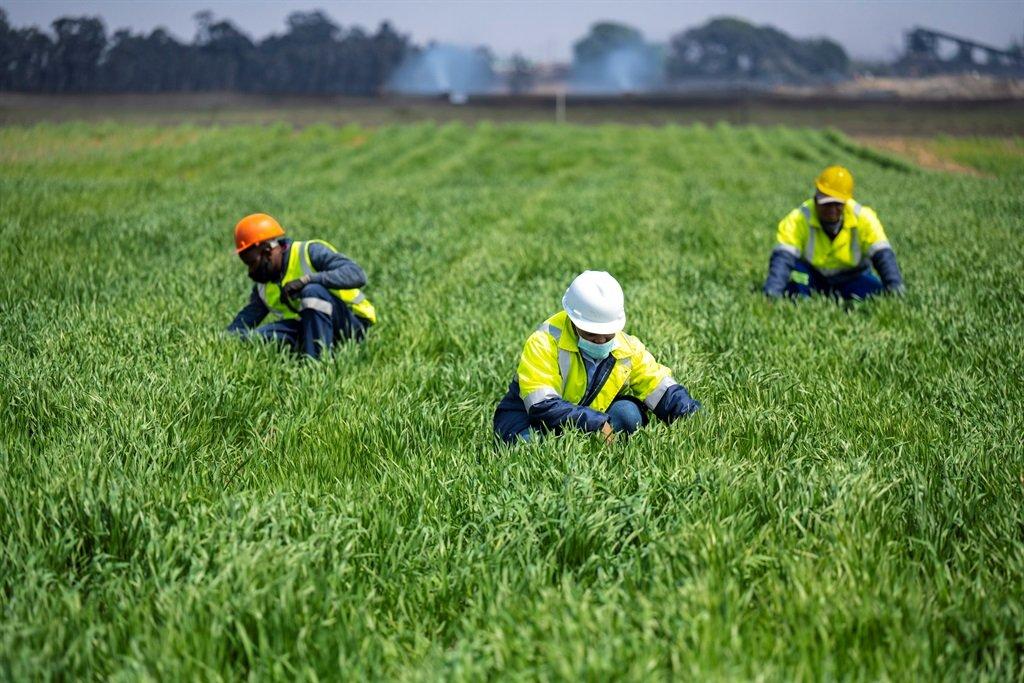Africa-Press – South-Africa. A pilot study to explore the viability of growing wheat on old coal mining land in Mpumalanga has shown surprising results, with crops using remediated land mine-affected water offering higher yields than those planted on virgin soil.
The first crops were harvested in November last year after researchers conducted side-to-side comparisons using two varieties of winter wheat that were shown to be capable of adapting to the environment of Mpumalanga.
“What those trials showed is we had a superior yield using remediated land and mine-affected water. It beat the pants off virgin soil,” says John Cook, director of Africa operations at Business for Development (B4D), an NGO leading the pilot in partnership with Glencore, the International Council of Mining and Metals, The Impact Catalyst, and the Mine Water Coordinating Body. Tests so far have shown the grain to be safe for human consumption and in compliance with World Health Organisation and South African food safety standards, Cook says.
GoodNews24: Read all the feel good stories
“The truth is, people had made up their mind about remediated land and mine water, and this little test has shown that maybe we need to think again because we might have overlooked something which could have fundamental value.”
The promising results offer hope for the communities in the coal heartland of Mpumalanga that are highly dependent on coal mines and power plants and stand to be adversely impacted in the global transition away from fossil fuels in favour of cleaner energy.
While the repurposing of coal mines and power plants for agriculture and other industries to ensure a just energy transition is a hot topic, there are very few visible projects underway to progress research in this critical area.
The Winter Wheat project stems from a workshop held on the sidelines of the 2019 Mining Indaba to discuss how business and miners could think about sustainable livelihood opportunities for communities exposed to mining.
B4D is a non-profit organisation founded on the belief is that business can help address issues like poverty and food security by partnering with stakeholders to create sustainable and profitable outcomes.
In Kenya, for example, B4D runs agricultural programmes which supply significant quantities of ethical cotton to Cotton On, Australia’s largest retailer.
With years of experience working for the Kellogg Company all over the world Cook has in-depth knowledge of the cereals business which has “an almost inexhaustible appetite for commodities”, he says.
Adriaan Basson | No jokes – SA is a country of heroes without capes
Approached by B4D, the food manufacturing giant expressed keen interest in exploring the use of grain grown on remediated land, if indeed it were viable.
In launching the pilot study, Cook set out to compare the yield of growing winter wheat on virgin soil as compared to a remediated site. He also wanted to compare a crop using natural rainfall compared to bore water, reservoir water, and mine-affected water. He further wanted to compare crops using the agronomy – the science of soil management and crop production – that a smallholder farmer would deploy on their property to a far more scientific approach.
Test results show no issues with heavy metals. Iron and zinc were slightly above tolerance levels but Cook says it’s worth noting that these two minerals are commonly deficient in African diets.
“The mine-affected water is naturally alkaline and so solves the acidity problem of Africa soils and we found the use of it, in a situation where the seasonal rains were disappointing last year, we managed to raise a very successful crop,” Cook says.
Now, the researchers will take a closer look at how the study site was remediated to understand the science underpinning why the site has proven to be so productive.
The trial will also now expand and discussions are underway to obtain water use licenses so that the implications of using mine-affected water on soils and the impact on the water table is thoroughly understood. It is also recognised that the need to run and maintain wastewater treatment for the benefit of wheat crops may pose a risk to an eventual business case.
To mill the pilot study crop, B4D has partnered with StartWell Foods, a non-profit funded by the Inani StartWell Foundation, which produces a range of grain-based care products for infants and the elderly.
Once processed, the grain will be subjected to further testing.
StartWell, which partners with businesses and feeding schemes to deliver nutrient-dense meals to poverty-stricken areas, has meanwhile expressed interest in purchasing grain produced by the project.
Both Kellogg and StartWell’s mills are located in Springs, but source a lot of product from Mpumalanga. Cook hopes that new agricultural projects on the coal belt can someday reach levels to justify investment in nearby milling facilities, thereby creating even more jobs.
The first step in the journey has begun. That is, is proving that the remediated land and water can indeed be used for agriculture. The next step is to work with other mining companies to see if their sites can generate similar results. Thereafter, Cook hopes to work with the community on the mine sites to grow crops.
“And so they start growing more and more grain, and it creates an opportunity to think about processing grain close to the farms, and that processing potentially leads to the development of new industries.”
That’s what happened in Kenya. “When I started the programme in 2012, I was told by the Kenyan government that cotton is not a priority. Cotton is now a priority,” says Cook adding that thousands of farmers now grow thousands of tons of cotton that goes into millions of T-shirts.
“It’s like the mustard seed,” he says. “A tiny little thing can grow into something big if you nurture it.”
Do you have a good news story you want to share? E-mail
For More News And Analysis About South-Africa Follow Africa-Press






